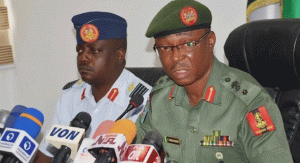
Wants military operations investigated by National Assembly, CSOS
Front lineWants military operations investigated by National Assembly, CSOS: Civil Rights Advocacy Group- HUMAN RIGHTS WRITERS ASSOCIATION OF NIGERIA (HURIWA) has called for independent verification teams made up of the National Human Rights commission of Nigeria and credible Civil Rights Advocacy groups to observe the implementation of the ongoing internal security operations by the Nigerian military in the South East with specific reference to Anambra State given the allegations of the use of excessive force resulting in extralegal execution by the Army against the civil populace.
HURIWA has also asked the relevant committees of the states and National Assemblies to investigate reports of the widening application of excessive military force and the use of extrajudicial killings in the South East of Nigeria by soldiers.
In a media statement by the National Coordinator Comrade Emmanuel Onwubiko and the National Media Affairs Director Miss Zainab Yusuf, HURIWA said there is urgent need for an oversight mechanism to be activated in Anambra State and all other areas of internal military operations because it has become obvious and pathetic that most members of the Military institution in internal security operations have also been characterized with extra judicial killings.
HURIWA lamented that extrajudicial killings is now no longer a new problem because as far back as on April 2013, the Borno State Governor, Kashim Shettima, said that over 100 people were killed in Baga during a clash between officers of the Joint Task Force and insurgents. Residents of the village said they buried 185 people after the battle, while the Red Cross has said 187 people were killed.
Also, The human Rights Watch also reported that during a military operation which began on October 22, 2001, soldiers from the 23rd Amored Brigade of the 3rd Amored Division rounded up villagers at Gbeji (in Zaki Biam area of Benue State) in what turned out to be a “ployed‟ meeting.The soldiers made the villagers to sit on the ground, separating thereby men from the rest and opening fire on the men indiscriminately.10 There have also been several reports on extra judicial killings by the military in Nigeria.
HURIWA is warning soldiers to respect the law because domestic laws usually apply in internal security operations, but this is however influenced by the rules and standards of international law. Domestic laws provide the basis for military involvement in internal security operations while international human rights law regulates the conducts of operations, military or otherwise in those situations.
“In Nigeria, the first law is the Constitution which empowers the President to use federal forces to combat domestic disturbances. These disturbances only serve as threats to the rights of some individuals or group in some particular areas of the nation, these are not threats to the national security. Section 217 of the 1999 Constitution is to the effect that the military, under the directive of the President can act in the aid of civil authorities to restore law and order. Pursuant to this section, the military has often been called upon to suppress acts of riots, demonstrations and terrorism in order to restore peace, law and order. Section 305 of the Constitution which empowers the President to issue a proclamation of state of emergency is another basis for military internal security operations”.
“This section provides that state of emergency shall be declared in the following situations: • When there is actual breakdown of public order and public safety in the federation or any part thereof to such extent as to require extraordinary measures to restore peace and security.
• Also, if there is clear and present danger of an actual breakdown of public order and public safety in the federation or any part thereof requiring extraordinary measures to avert such danger; Or there is an occurrence or imminent danger or the occurrence of any disaster or natural calamity affecting the community or a section of the community in the federation, or there is any other public danger which clearly constitutes a threat to the existence of the federation.”
“These provisions above all refer to the breakdown of public order and public safety and the need to restore same. Although the duty to restore of law and order within the country is that of the civil authorities which is the Nigeria Police, the provision of Section 217 of the 1999 Constitution comes in handy here as it is to the effect that the military can be called upon to aid civil authorities to restore public order in any part of the country.”
HURIWA submits that in line with these Constitutional provisions, the military always performs internal security operations when a state of emergency is proclaimed. The 1999 Constitution also safeguards human rights by providing for the rights to life, right to personal liberty, right to privacy, right to human dignity.
The Rights group recalled that the Nigerian military had on many occasions engaged in peace keeping operations in foreign countries on a number of occasions and has been commended for its noble conduct during those occasions, Sierra leone and Liberia are good examples. However, the current security operations in the South East of Nigeria is not without loud complaints about the problem of high handedness and insensitivity to the nature and characteristics of civilian dominated areas is always pointed out as a flaw. A number of features are associated with the Nigerian military engaged in internal security operations most of which are negative.



